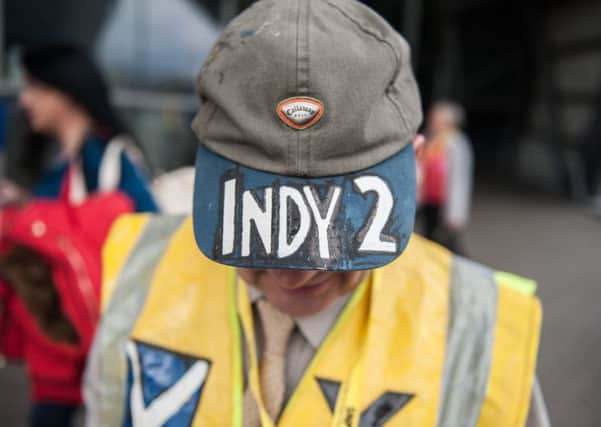Darren McGarvey: If nationalism is your article of faith, make sure that faith's not blind


As the division in Scotland deepens, and the naked tribal impulse driving much of the political debate is laid bare, there are parallels between the religious belief of old and the nationalist crowd psychology which has replaced it.
Firstly, it’s important to acknowledge that there are different degrees of adherence to both religion and nationalism that must be recognised as distinct. It’s unhelpful to talk in generalisations about either and I will do my best to avoid doing that. I am a nationalist in that I believe strongly there should be a link between a physical border on a map and the scope of political autonomy available to the people contained within that territory. As for religion, I do not believe in an omnipresent deity, capable of hearing my prayers and observing my mind, but I recognise the personal and social benefit of aspiring to live the sort of enlarged spiritual life a sensible adherence to a religious faith can inspire.
Advertisement
Hide AdAdvertisement
Hide AdIt must also be said that when it comes to hyper-idealism and nationalistic fervour I have more than a bit of insight. Raised in a community steeped in the politics of the radical left, I was voting SNP by 2006; drawn to their left-wing platitude about reforming council tax and taxing higher earners after the collapse of the Scottish Socialist Party. At that point, the world was a black and white moral landscape where the people I agreed with were the good guys and everyone else was suspect. For me, it has been a slow (often painful and confusing) journey from the hyper-moral worldview in which the Yes movement was couched and the sobering reality that, despite my good faith, SNP strategists saw people like me coming a mile away. Like all political parties, they specialised in re-appropriating disaffected anger and a sense of injustice for their own political ends.
However, the SNP objective was not simply to oust the party in power but to break the British state. The anger at the system felt by people like me became a battering ram that gave their previously hollow, culturally frictionless nationalism a bit of heart, social electricity and political muscularity. Having awoken to that cynicism (or political genius depending on where your allegiance lies), my belief in Scottish independence has evolved. I still believe that self-determination at national level is, ultimately, the best way to organise our society in the long term. But the quality of this belief is no longer so extreme that it persists at the expense of all other considerations.
Sadly, this new-found respect for the diversity of opinion is not shared by some, who haven’t moved on from the gut-wrenching morning of 19 September, 2014. The problem is: nationalism is such a volatile form of cultural energy that it doesn’t take much for it to become radioactive. Which is why it is short-sighted of any politician who would attempt to appropriate it for their agenda. Nationalists who self-identify as civic or socially progressive can quickly turn hostile and cruel all the while believing themselves to be critically engaged and morally upright.
On Monday night, this crowd psychology triggered a social media witch-hunt that led to the hounding and vilification of a nurse; deemed to be undeserving of charity from food banks because she has pink hair and was alleged to have drank Prosecco once. Intoxicated by a vague moral intuition, based on nothing but nationalist impulse, people who spend large parts of their day calling Tories scum for stereotyping the poor were outlining the strict criterion prospective food bank users must meet before they are entitled to charity. The very people who rightly condemned Tory welfare policies as cruel and humiliating were suddenly demanding that a nurse have her bins raided to prove she was deserving of support and compassion.
This bizarre inversion of principle, where Yes voters started to sound like Tories, is precisely what happens when political conviction over-reaches into the domain of blind religiosity. And this is the danger that nationalism presents – wherever it is found.
But those of you, nodding in agreement with much of this article, keen to ascribe the behaviour of one intolerant congregation to the broader church of the Yes campaign, ought to be aware of this religious impulse in yourselves. It’s easy to see us all as a flag-waving monolith and cite this Twitter storm as irrebuttable proof that the basic integrity of the indy movement is compromised. But it cannot be denied that the most robust critique of this toxic variant of Scottish nationalism, which rightly concerns people on both sides of the constitutional fault-line, often comes from within the Yes movement itself, where we believe strongly in holding ourselves to account and often pay a higher price for heresy than many unionists realise.
Darren McGarvey is also known as Loki, a Scottish rapper and social commentator @lokiscottishrap